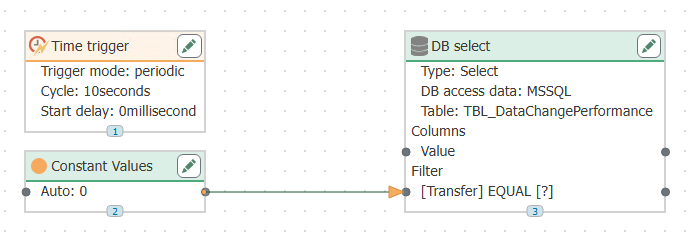... Read Out All Data Sets, Which Haven't Been Transferred?
To read out all data sets which havn´t been transfered from a table, you need a column, in which the OPC Router can mark a successfull transfer. You start a request with a filter on this transfer column.
Required fields/columns:
| <Transfer> | Column, in which a successfull transfer is shown (Type: int, standard value: 0) |
| <Values> | Column(s) with values of interest |
Project a data base transfer object with the following properties:
| Data Base Access Data | <Your data base access data from the plug in configuration> |
| Type | Select |
Tab: General
| Table | <Table, which includes your data> |
| Available Columns/ Used Columns | <All value columns> |
Tab: Filter
| Filter | “Add Filter” creates a new filter. |
| Edit Filter/ Filter Group | Column: <Transfer> Compare Operator: EQUAL |
| Preview | Here should be stated now: WHERE (Transfer = ?) |

Database Select Transfer Object - Filter
Tab: Query
| Sorting by Columns | as needed |
| Order of Sorting | as needed |
| Reducing the number of data sets to | deactivated. All data sets with <Transfer> = 0 shall be transfered. |
| Error with empty select | deactivated. If no new, current data set is available, it should be no mistake. |
| Cancel transfer with empty select | activated. Nothing is transfered, if no new data set is available. |
This transfer object filters the data by the transfer code. For the transfer code you have to enter “0”. Create a constant object with:
Required constants
| 0 | for data sets which havn´t been transfered |
Connect the 0 to the filter element Transfer:

Transfer Objects
Project a time trigger, which pollst the data base cyclicly.
After the transfer the OPC Router writes “1” the column Transfer, with transfer errors “2”. With this projecting the new data sets with Transfer = 0 are transfered. Of course you can project more filters, as e. g. the ID of the test series from the previous example.